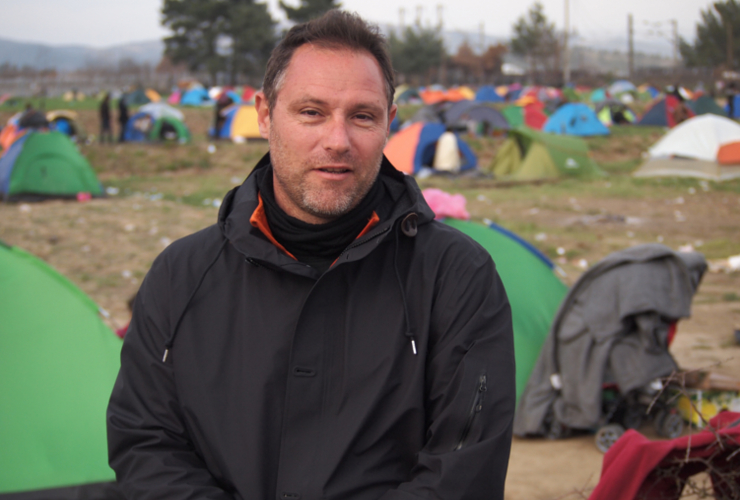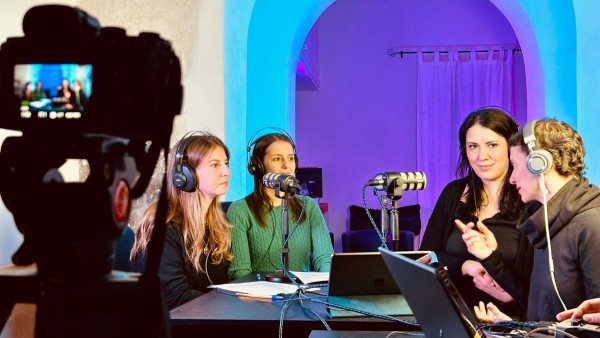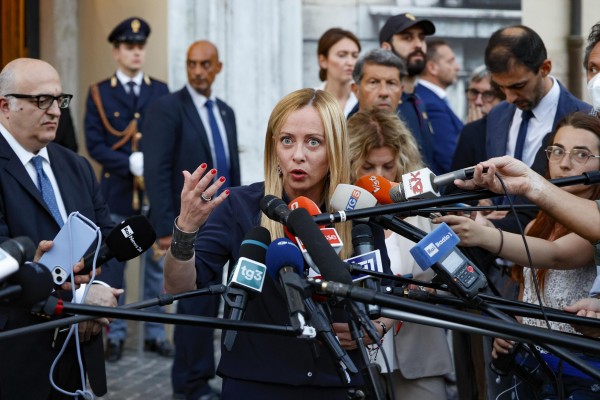Christmas of 2014 found Antonis Repanas, a well-known and respected sports journalist in Thessaloniki, Greece, facing a dead end.
He had just been fired by one of the biggest national newspapers in Greece, Ta Nea. Making matters worse, Thessaloniki’s media industry had been hit hard: there were hardly any serious opportunities for a professional journalist.
“Losing your job in Greece, where traditional media conglomerates are collapsing and digital media have yet to become sustainable, may mean you will never be able to work again as a journalist,” Repanas said in a recent interview with the International Press Institute (IPI).
Indeed, hundreds of Greek journalists have been unable to escape the cycle of unemployment wrought by the country’s economic troubles.
Repanas is one who found a way out.
Spurred into action by Greece’s refugee crisis, Repanas managed to transform the unpleasant experience of his firing into a life-changing moment and to reinvent himself as a partner for prestigious global media outlets like Al Jazeera and the BBC.
A work model over for good
For Repanas, reality set in quickly after the loss of his job.
“After I was fired from the newspaper where I’d worked more than 16 years people came up to me and said ‘You’re such a good journalist, something will definitely come up’,” he recalled.
“But deep down I knew that the work model that I’d been accustomed to was over for good.”
He knew the pattern all too well: as a member of the board of directors of the Journalists’ Union of Macedonia & Thrace Daily Newspapers (ESIEMTH), he had used the same words to console many of his colleagues who had lost their jobs before him.
“I had seen what unemployment can do to a person. It can lead to low self-esteem, sadness, even depression.”
A journalist’s instinct
Repanas was determined to escape the spiral that had swallowed so many other journalists in Greece.
The opportunity that would change his path arose in 2015 amid the refugee crisis. Idomeni, a small village near the border with the Former Yugoslav Republic of Macedonia (FYROM), had become the centre of interest for Greece’s media: thousands of refugees had gathered there hoping to follow the “Balkan route” to Western Europe. When FYROM closed its borders, Idomeni morphed into a huge camp with thousands of desperate refugees.
Repanas suddenly felt the sharp jab of journalistic instinct. “I knew I had to go. I had to tell these stories,” he said.
He went to Idomeni for the first time in October of that year, initially with a friend who worked for Médecins du Monde (MDM), and later on his own. A first problem soon became obvious: How can you cover a story when you have no one to report to?
Not willing to let that “detail” discourage him, Repanas used his Facebook page to post short stories about the people he met in Idomeni and to upload numerous pictures and videos raising awareness about the camp’s poor living conditions.
The little things
“I like to pay attention to the little things,” Repanas said. “Some people prefer to read big, touching stories about refugees’ being tortured by ISIS, left crippled and things like that. What I tried to do was to shed light to the details of everyday people there.”
And so he did. He wrote about Ahmed who wanted to find his brother in Germany; about 14-year-old Rida who dreamt of becoming a doctor; about little Hamdi who loved to play football, and many others.
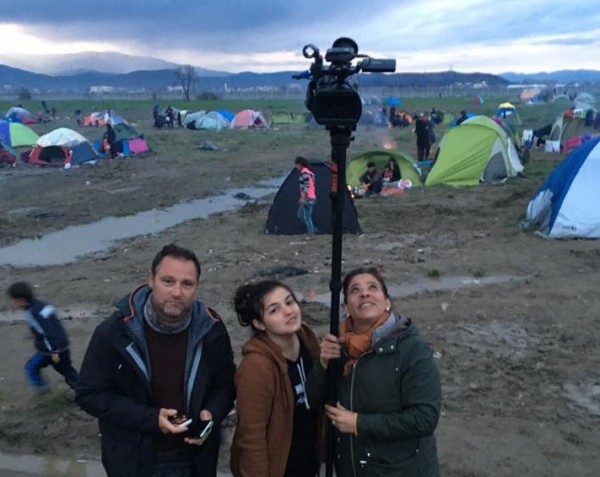
Antonis Repanas at the refugee camp near Idomeni, Greece. Photo courtesy Antonis Repanas.
The people he met in Idomeni inspired him to create a website called human stories. The site, run by Repanas together with his wife, Machi, and a colleague, Stelios Moschoulas, covers not only refugees but also everyday people in Greece who, despite the crisis, do their best to make a new beginning.
Even after most other journalists had left Idomeni, Repanas kept reporting. He was there when heavy rains hit to report on the camp’s inadequate shelter. He was there, too, when Chinese artist Ai Weiwei visited and even when Greek police tried to evacuate the camp.
He recalled: “What I realised was that the rest of the media didn’t have the resources (time, money or even journalists) to cover the refugee crisis in Idomeni the way they should. They would just send a journalist when there was something very serious happening, or they would just sometimes call me, to ask what was going on.”
His dedication began to open doors. First, a reporter from the New York Times asked him to cooperate on an article about the refugees in Idomeni. Then he began cooperating with Al Jazeera as a freelancer.
Laurence Lee, a senior Al Jazeera correspondent, remembers vividly the first time he met Repanas.
“He met me and my team at the airport in his car,” Lee told IPI. “It looked like the wheels could fall off it any time.”
‘He cared about them’
Working with Al Jazeera brought Repanas new opportunities.
“It became clear very soon that [Repanas] had spent enormous amounts of time talking to refugees – not only because there might be a story in it for his ‘Human Stories’ Facebook page, but just because he cared about them,” Lee said. “We have worked together now on very many occasions, and his passion for the issue has never diminished.”
Lee and Repanas have cooperated to cover every aspect of the refugee crisis. They travelled to Lesbos, Chios, Samos, Albania and even Turkey. While in Greece, they also did some stories on the local economy.
Separately, Repanas worked with the BBC on the award-winning documentary “Exodus”.
Over time, Repanas also picked up some awards of his own. In 2017, he received the prestigious Journalism Prize of the Botsis Foundation for the Promotion of Journalism for his “investigative journalistic approach as well as for his recording and highlighting of human, personal stories that fully reflected the genuine dimension of the refugee issue’’. The prize was presented by Prokopis Pavlopoulos, president of the Hellenic Republic, in a ceremony attended by representatives of Greece’s political, religious and military leadership.
He has also been awarded three times by the Panhellenic Association of Sports Press (PSAT).
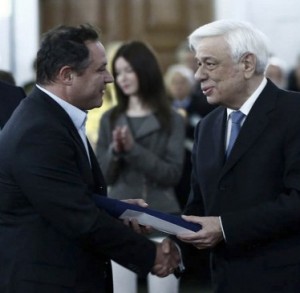
Repanas receives the Journalism Prize of the Botsis Foundation for the Promotion of Journalism from Greek President Prokopis Pavlopoulos in 2017. Photo courtesy Antonis Repanas.
The power of change
Repanas admits that, especially early on, he questioned himself and whether driving to Idomeni almost every two days was worth it.
“There were days when I had no money for gas, or the weather was too heavy,” he said. “Machi, my wife, encouraged me to keep reporting and that’s what I did.”
Now, with his awards, professional collaborations and refugee friends all over Europe, Repanas has no doubts as to whether it was all worth it or not.
What is more, his example proves that the distance between an unemployed sports journalist and a well-esteemed field editor for prominent global media outlets is not so great after all.
“Antonis is partly journalist of very high calibre, and partly campaigner,” Lee said. “He didn’t have to do any of it – he lost his job, the media industry was imploding and could have got a job doing something else. He is an amazing combination of journalistic entrepreneurialism in the face of a personal crisis of his own as well as a shining example of human rights advocacy.”
Repanas is too modest to comment on Lee’s effusive praise, but he does believe that a good journalist must never give in.
“I have been a sports journalist all my life, but I always believed that a journalist should have no limitations in his job,” he said. “When the opportunity occurred I just did what I knew best: research and report.”
“Journalism as we have known it in recent decades is being transformed, there is no doubt about that. But that means that we have to change and adapt as well. I really believe that this is the best of times for a journalist to keep reporting”.

